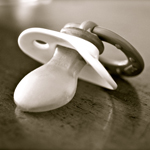How to Wean Your Child Off the Binky
Pacifiers are, as the name implies, peacemakers. As people who are around babies day and night, we support anything that keeps babies peaceful. Preferably this should be live caregivers, but sometimes human pacifiers need a break. As with all substitute nurturing devices, this is a question of balance. When a pacifier is used in addition to nurturing, it can be a comforting tool. If it is used instead of nurturing, it is a distance-producing device. If, when your infant cries, you find yourself reaching for the plug instead of the baby, or your baby reaches for the dummy instead of the mommy, you need to reassess your parenting. You want your baby to become attached to you, not to an inanimate sub.
If your baby is bonded to his binkie, six months is a good age to stop giving it to him. He’s still young enough to learn to use his thumb (or your breast), so he will not become unglued when the plug stops showing up. As you helped your baby start this habit, you can be the one to end it. Just stop putting it in his mouth to keep him quiet. Try more attachment instead. If you are breastfeeding, let your baby pacify at your breast. Some babies think breasts are just for food because they haven’t been encouraged to “hang out at mom’s” until they’ve filled their sucking needs as well as their tummies.
A baby with an ever-present plug as his way of self-soothing could become addicted to always having something in his mouth. As a toddler he may not develop alternative ways to self-soothe and reconnect (he may not play quietly or ask for holding, for example). He may even be delaying or inhibiting his ability to express himself and relate socially. Once again, the plastic plug is riskier than the thumb, and the breast poses no risk at all.
What about the three-year-old who is addicted to his “paci”? Consider these tips:
- Trade it. If the child is old enough not to be sucking on a pacifier, he is probably smart enough to settle for a better toy. Take him to the store and make a deal with the toy salesman. Let him pick out his favorite toy. Let the child pass over the pacifier to the toy salesperson, who in turn presents the alternative.
- Encourage the child to use his plug in private. Mention that older children doing things that babies do bothers some adults. “If you really must use your pacifier, please use it in your room.” By approaching it this way and making the pacifier less convenient to use, the child will soon wean himself.
- Use relaxing substitutes. Teach the child to put on a favorite tape and start singing as soon as he gets the urge to reach for the pacifier. It’s difficult to suck and sing at the same time. Keep yourself relaxed and peaceful, and offer a lot of quiet connection, such as reading books together, blowing bubbles together, and “just-being” time.
- Just say “all done” and take it away, with the explanation that it’s not helping the child be a big boy or girl. Attachment-parented children living in a peaceful home should give it up fairly easily – if you expect them to.
If you would like to work with a Certified Health Coach during your pregnancy, or postpartum, you can find a Coach in your area.

